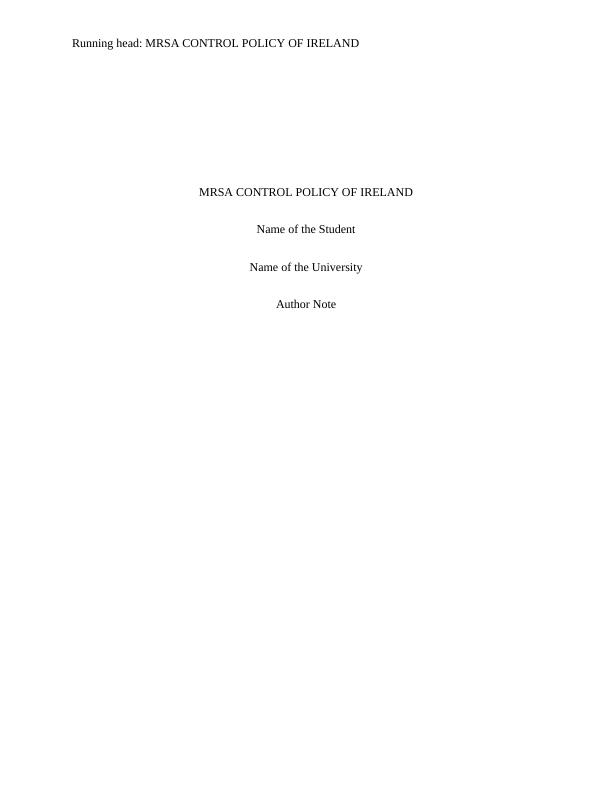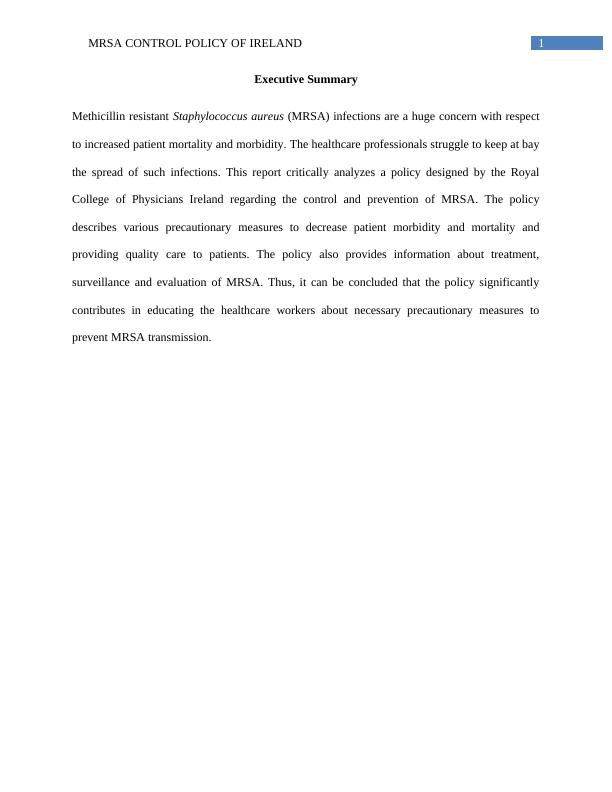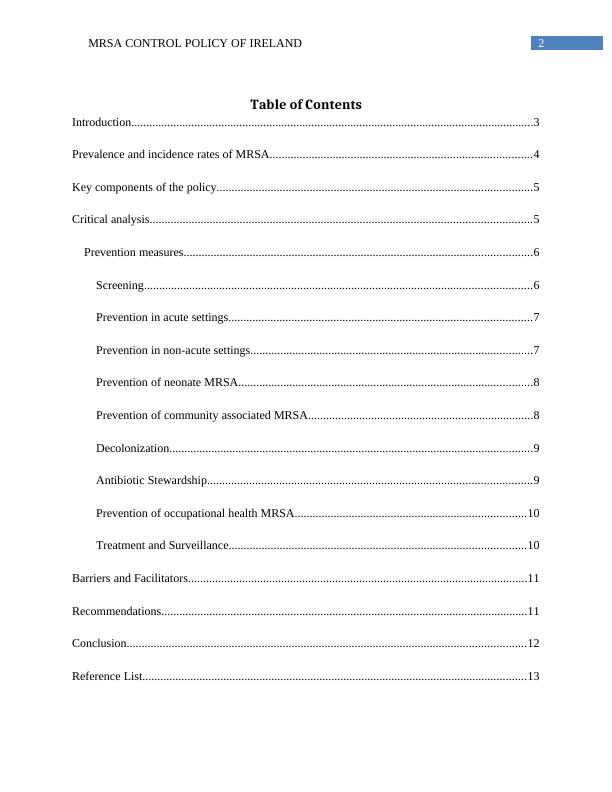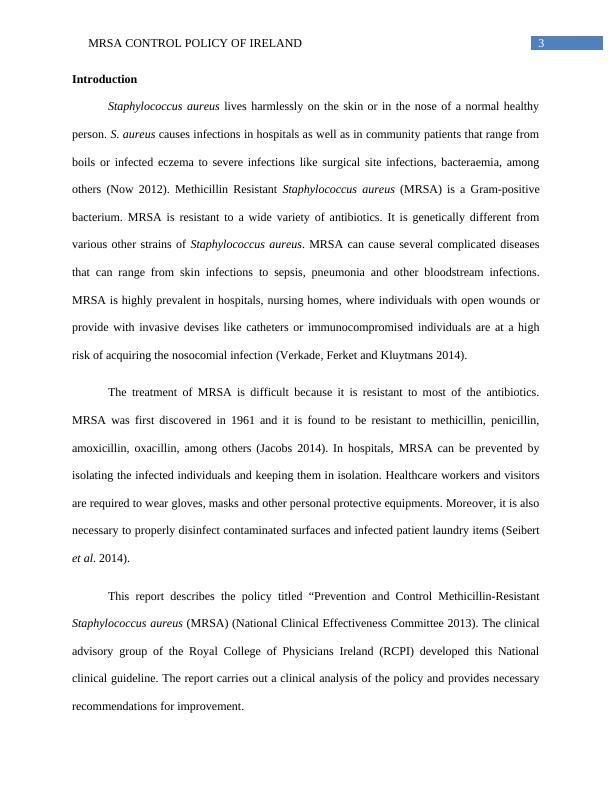The Royal College of Physicians Ireland Report
17 Pages4455 Words46 Views
Added on 2020-04-15
The Royal College of Physicians Ireland Report
Added on 2020-04-15
ShareRelated Documents
Running head: MRSA CONTROL POLICY OF IRELANDMRSA CONTROL POLICY OF IRELANDName of the StudentName of the UniversityAuthor Note

1MRSA CONTROL POLICY OF IRELANDExecutive SummaryMethicillin resistant Staphylococcus aureus (MRSA) infections are a huge concern with respectto increased patient mortality and morbidity. The healthcare professionals struggle to keep at baythe spread of such infections. This report critically analyzes a policy designed by the RoyalCollege of Physicians Ireland regarding the control and prevention of MRSA. The policydescribes various precautionary measures to decrease patient morbidity and mortality andproviding quality care to patients. The policy also provides information about treatment,surveillance and evaluation of MRSA. Thus, it can be concluded that the policy significantlycontributes in educating the healthcare workers about necessary precautionary measures toprevent MRSA transmission.

2MRSA CONTROL POLICY OF IRELANDTable of ContentsIntroduction......................................................................................................................................3Prevalence and incidence rates of MRSA.......................................................................................4Key components of the policy.........................................................................................................5Critical analysis...............................................................................................................................5Prevention measures....................................................................................................................6Screening.................................................................................................................................6Prevention in acute settings.....................................................................................................7Prevention in non-acute settings..............................................................................................7Prevention of neonate MRSA..................................................................................................8Prevention of community associated MRSA...........................................................................8Decolonization.........................................................................................................................9Antibiotic Stewardship............................................................................................................9Prevention of occupational health MRSA.............................................................................10Treatment and Surveillance...................................................................................................10Barriers and Facilitators.................................................................................................................11Recommendations..........................................................................................................................11Conclusion.....................................................................................................................................12Reference List................................................................................................................................13

3MRSA CONTROL POLICY OF IRELANDIntroductionStaphylococcus aureus lives harmlessly on the skin or in the nose of a normal healthyperson. S. aureus causes infections in hospitals as well as in community patients that range fromboils or infected eczema to severe infections like surgical site infections, bacteraemia, amongothers (Now 2012). Methicillin Resistant Staphylococcus aureus (MRSA) is a Gram-positivebacterium. MRSA is resistant to a wide variety of antibiotics. It is genetically different fromvarious other strains of Staphylococcus aureus. MRSA can cause several complicated diseasesthat can range from skin infections to sepsis, pneumonia and other bloodstream infections.MRSA is highly prevalent in hospitals, nursing homes, where individuals with open wounds orprovide with invasive devises like catheters or immunocompromised individuals are at a highrisk of acquiring the nosocomial infection (Verkade, Ferket and Kluytmans 2014). The treatment of MRSA is difficult because it is resistant to most of the antibiotics.MRSA was first discovered in 1961 and it is found to be resistant to methicillin, penicillin,amoxicillin, oxacillin, among others (Jacobs 2014). In hospitals, MRSA can be prevented byisolating the infected individuals and keeping them in isolation. Healthcare workers and visitorsare required to wear gloves, masks and other personal protective equipments. Moreover, it is alsonecessary to properly disinfect contaminated surfaces and infected patient laundry items (Seibertet al. 2014). This report describes the policy titled “Prevention and Control Methicillin-ResistantStaphylococcus aureus (MRSA) (National Clinical Effectiveness Committee 2013). The clinicaladvisory group of the Royal College of Physicians Ireland (RCPI) developed this Nationalclinical guideline. The report carries out a clinical analysis of the policy and provides necessaryrecommendations for improvement.

End of preview
Want to access all the pages? Upload your documents or become a member.
Related Documents
Effectiveness of Interventions to Prevent MRSA Infection in Hospital Settingslg...
|9
|2602
|38
Controlling Transmission of Healthcare Acquired MRSAlg...
|8
|3492
|100
Controlling Transmission of Healthcare Acquired Methicillin-Resistant Staphylococcus Aureus (HA-MRSA) Infectionslg...
|12
|4091
|470
Acquired Infectionlg...
|11
|3129
|339
The Art and Science of Nursinglg...
|13
|3341
|26
Effectiveness of Interventions to Prevent MRSA Infection in Hospitalslg...
|17
|4823
|27
